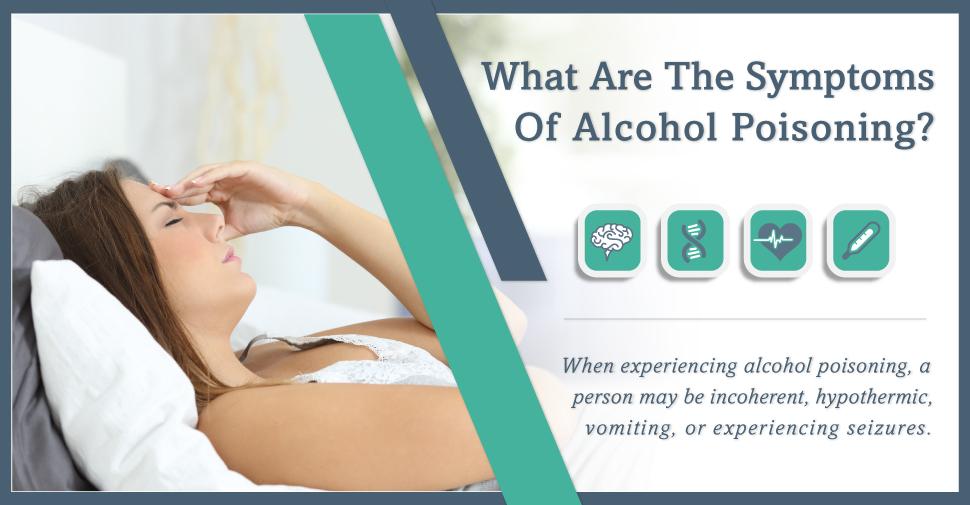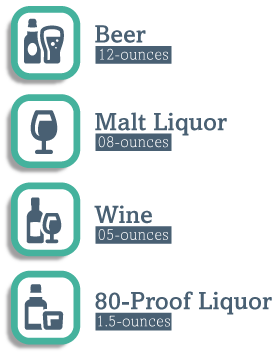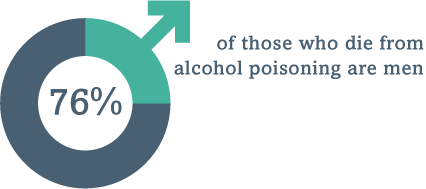
Alcohol poisoning happens all around the United States, and affects high school and college students, and grown adults. When experiencing alcohol poisoning, a person may be incoherent, hypothermic, vomiting, or experiencing seizures. The most likely population to experience alcohol poisoning is men between 35 to 64 years old. Alcohol abuse and binge drinking are the largest contributors to alcohol poisoning, and 6 people die each day in the United States by overdosing on alcohol. There is most likely treatment near you.
Not every person gets completely loaded as soon as they’re old enough to (legally) drink alcohol—and not every person who drinks alcohol does it to get drunk; on the contrary, some people only drink to get drunk. Even though 11 percent of the alcohol consumed in the United States is by minors, you might be surprised to learn that three in four deaths from alcohol poisoning are people 35-64 years old. Alcohol abuse and binge drinking are the biggest contributors of alcohol poisoning—not necessarily inexperience.
What Is Binge Drinking?
Alcohol abuse is better understood as drinking too much, drinking to get drunk, or drinking to cope with certain problems or situations in a person’s life. Binge drinking, on the other hand, has a more definitive meaning, and is the biggest cause of alcohol poisoning. In order to define binge drinking, we must first define a standard drink. According to the U.S. Department of Health and Human Services, a standard drink is:
- 12-ounces of beer (5% alcohol content)
- 8-ounces of malt liquor (7% alcohol content)
- 5-ounces of wine (12% alcohol content)
- 1.5-ounces of 80-proof liquor (40% alcohol content) – (e.g., gin, rum, vodka, whiskey)
For men, binge drinking is 5 or more standard drinks in 2 hours, whereas for women, binge drinking is 4 or more drinks in 2 hours. So binge drinking doesn’t only exist on college campuses, after your best friend’s wedding, or after your high school prom, it can happen with either veteran drinkers or underage drinkers.
Alcohol Poisoning Definition
Also known as acute alcohol intoxication and alcohol overdose, alcohol poisoning usually comes without warning. Sometimes it happens after a person decides to sleep off a hard drunk, which can be a pretty common scenario for teens and college students, but it can happen to just about anybody who drinks to excess. According to the National Council on Alcoholism and Drug Dependence, “alcohol poisoning or alcohol overdose is caused by drinking too much alcohol too fast.”

By the medical definition, alcohol poisoning is “a condition in which a toxic amount of alcohol has been consumed, usually in a short period of time. The affected individual may become extremely disoriented, unresponsive, or unconscious, with shallow breathing. Because alcohol poisoning can be deadly, emergency treatment is necessary” (Medicine Net).
What Are The Critical Signs And Symptoms Of Alcohol Poisoning?
Sometimes alcohol poisoning isn’t obvious—and a person starts off with a slight buzz; then as the night progresses, they become more outgoing; this is often followed by even more boisterous and rowdy behavior if they continue drinking. After that, if they haven’t stopped yet, they may experience a blackout—which doesn’t necessarily mean that they will experience an overdose, but the chances will be much greater.
Here are some of the things to look for to determine alcohol poisoning:
- Mental confusion, stupor, coma, or inability to wake up
- Vomiting
- Seizures
- Slow breathing (fewer than 8 breaths per minute)
- Irregular breathing (10 seconds or more between breaths)
- Hypothermia (low body temperature), bluish skin color, paleness
(National Institute on Alcohol Abuse and Alcoholism)
What To Do In Case Of Alcohol Poisoning
 If you think that someone might be too drunk, it’s important to keep an eye on them—a lot of people die in their sleep from alcohol poisoning. If your friend is unresponsive call 911, and try to turn them onto their side. Keep them sitting upright if they’re still awake, and get them to drink some water.
If you think that someone might be too drunk, it’s important to keep an eye on them—a lot of people die in their sleep from alcohol poisoning. If your friend is unresponsive call 911, and try to turn them onto their side. Keep them sitting upright if they’re still awake, and get them to drink some water.
You could very well save your friend from death by alcohol poisoning—if you or your friend is a minor, they might get into a little trouble, but getting charged with a minor in possession is way better than being dead. They may wake up with a hangover, and a hazy recollection of the night before, but this is to be expected after binge drinking.
What To Do If I Suspect Someone Has Alcohol Poisoning?
- Know the danger signals—
- Do not wait for someone to have all the symptoms
- Be aware that a person who has passed out may die
- If you suspect an alcohol overdose, call 911 for help
What Can Happen If Alcohol Poisoning Goes Untreated?
- Choking on his or her own vomit
- Breathing that slows, becomes irregular, or stops
- Heart that beats irregularly or stops
- Hypothermia (low body temperature)
- Hypoglycemia (too little blood sugar), which leads to seizures
- Untreated severe dehydration from vomiting, which can cause seizures, permanent brain damage, and death
(National Institute on Alcohol Abuse and Alcoholism)
Can You Die From Alcohol Poisoning?
Yes… “There are more than 2,200 alcohol poisoning deaths in the U.S. each year—an average of 6 alcohol poisoning deaths every day” (Center for Disease Control and Prevention). When someone drinks until they’re wasted, they don’t have the same problem solving skills that they might have when they’re sober. So the most practical answer is just to pass out and sleep it off, right? No. Actually this can be pretty dangerous; sometimes a person can go into an alcohol induced coma—in their sleep.
More About Alcohol Poisoning Deaths In The United States
According to the Center for Disease Control and Prevention, “the majority of deaths are among non-Hispanic whites…American Indians and Alaska Natives have the most alcohol poisoning deaths per million people.”

Furthermore, 76 percent of those who die from alcohol poisoning are men. States, police, schools, and communities have taken action in spreading awareness to the youth with programs like Drug Abuse Resistance Education and Mothers Against Drunk Driving.
How Is Alcohol Poisoning Treated
If a person is brought into the hospital via ambulance, they will more than likely be brought to the emergency room, where they will take all necessary precautions. The staff will monitor a person’s vital signs after an alcohol overdose, but sometimes this isn’t enough for complete treatment and further measures must be taken.
Typically, medical professionals will insert a tube into a patient’s throat and down the windpipe to open their airway. In order to keep them from urinating freely, they will also need to insert a catheter into the bladder. To keep a person hydrated, and ensure that their vitamin levels are at a healthy level, a person will also need to be hooked up to an intravenous drip (or IV).
How Long Does Alcohol Poisoning Last?
A person’s body can metabolize about 1 standard drink per hour, but alcohol poisoning is a result of drinking excessive amounts of alcohol. The duration of alcohol poisoning usually varies, and it depends on the severity of and the amount of alcohol in a person’s system and also a person’s metabolism. Sometimes, a person will be hooked up to what is known as a gastric lavage (or stomach pump) which can remove a substantial amount of alcohol much faster than it’s normally digested. Depending on all factors such as further injuries and complications, usually a person will be released from a hospital the next day after being brought in for alcohol poisoning.
Finding Treatment For Alcohol Use Disorder And Alcoholism
It’s important to remember that alcohol abuse and binge drinking can lead to more problems than just alcohol poisoning. It can lead to alcohol dependence, alcoholism, injuries, kidney problems, liver problems, brain problems, automobile deaths, loss of job, being kicked out of school, failed relationships, dual diagnosis, or wet brain. Recovery doesn’t stop when you leave the hospital for alcohol poisoning treatment—sometimes that’s only the beginning, and detoxification and inpatient treatment need to be the best next step. It all starts with admitting that you have a problem.
If you’re concerned about alcohol poisoning and ready to quit alcohol, for the sake of someone you love or for yourself, and you would like to learn more. Contact Us today at 1-833-473-4227 to speak to one of our understanding professionals. We can help you get the treatment you need!
For More Information Related to “What Are The Symptoms of Alcohol Poisoning?” Be Sure To Check Out These Additional Resources From DrugRehab.org:
- What is Alcoholic Hepatitis?
- Alcohol Rehab Centers and Treatment Programs For Alcoholism
- Understanding Alcohol Addiction
- Alcohol Effects – What Happens To Your Body
- Alcohol Addiction Quiz
Sources
Center for Disease Control and Prevention – Fact Sheets – Underage Drinking
Center for Disease Control and Prevention – Alcohol Poisoning Deaths
Medicine Net – Medical Definition of Alcohol Poisoning
National Council on Alcoholism and Drug Dependence – Alcohol Poisoning: A Medical Emergency
National Institute on Alcohol Abuse and Alcoholism – Alcohol Overdose: The Dangers of Drinking Too Much


